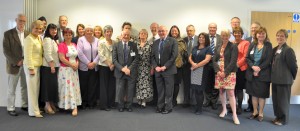Leadership is a word often bandied about with many people claiming, assuming or being allocated ‘leadership’ roles, but what does this actually mean when trying to bring about societal improvements? Last week as part of an NHS South of England project BU and Plymouth University hosted a 2 day workshop for strategic leaders in the NHS, Local Authorities and the voluntary sector responsible for strategic leadership in the world of dementia in Devon, Dorset and Somerset. The aim of this project is to promote improvements in the provision of dementia care at a time of fiscal challenge. Working across organisational and disciplinary boundaries, learning from others and acting rather than just talking about the policy directives and vision that contextualises dementia is key. We had several high profile speakers at the workshop, including the Chief Executive of the Alzheimer Society, Jeremy Hughes; the Clinical Lead for dementia for NHS England, Prof Alistair Burns; the immediate Past President of the Association of Directors of Adult Social Services (ADASS), Sarah Pickup; Angela Rippon a high profile ambassador for the Alzheimer Society as well as BU’s own director of the NCPQSW. Prof Keith Brown who does a lot of leadership training across the country. We also had a person living with dementia reminding us of why it is of utmost importance to ensure that people with dementia can live well with their dementia and really what the workshop was all about. Key messages I took from the 2 days that are perhaps transferable to anyone with a leadership role are first that it sometimes just important to get on and do what you need to do because it is the ‘right thing to do’ and this may be at odds with procedures, other colleagues perceptions and priorities but still worth doing! Good leaders sometimes need to buck the trend and with convention, and there were lots of dementia specific examples about how people have been innovative in challenging times. Another key leadership message related to working together and learning from others rather than reinventing the wheel. None of these are new messages but do highlight the ongoing challenges those with key strategic roles face as they work to address key societal concerns.
hosted a 2 day workshop for strategic leaders in the NHS, Local Authorities and the voluntary sector responsible for strategic leadership in the world of dementia in Devon, Dorset and Somerset. The aim of this project is to promote improvements in the provision of dementia care at a time of fiscal challenge. Working across organisational and disciplinary boundaries, learning from others and acting rather than just talking about the policy directives and vision that contextualises dementia is key. We had several high profile speakers at the workshop, including the Chief Executive of the Alzheimer Society, Jeremy Hughes; the Clinical Lead for dementia for NHS England, Prof Alistair Burns; the immediate Past President of the Association of Directors of Adult Social Services (ADASS), Sarah Pickup; Angela Rippon a high profile ambassador for the Alzheimer Society as well as BU’s own director of the NCPQSW. Prof Keith Brown who does a lot of leadership training across the country. We also had a person living with dementia reminding us of why it is of utmost importance to ensure that people with dementia can live well with their dementia and really what the workshop was all about. Key messages I took from the 2 days that are perhaps transferable to anyone with a leadership role are first that it sometimes just important to get on and do what you need to do because it is the ‘right thing to do’ and this may be at odds with procedures, other colleagues perceptions and priorities but still worth doing! Good leaders sometimes need to buck the trend and with convention, and there were lots of dementia specific examples about how people have been innovative in challenging times. Another key leadership message related to working together and learning from others rather than reinventing the wheel. None of these are new messages but do highlight the ongoing challenges those with key strategic roles face as they work to address key societal concerns.











 SPROUT: From Sustainable Research to Sustainable Research Lives
SPROUT: From Sustainable Research to Sustainable Research Lives BRIAN upgrade and new look
BRIAN upgrade and new look Seeing the fruits of your labour in Bangladesh
Seeing the fruits of your labour in Bangladesh Exploring Embodied Research: Body Map Storytelling Workshop & Research Seminar
Exploring Embodied Research: Body Map Storytelling Workshop & Research Seminar Marking a Milestone: The Swash Channel Wreck Book Launch
Marking a Milestone: The Swash Channel Wreck Book Launch ECR Funding Open Call: Research Culture & Community Grant – Application Deadline Friday 12 December
ECR Funding Open Call: Research Culture & Community Grant – Application Deadline Friday 12 December MSCA Postdoctoral Fellowships 2025 Call
MSCA Postdoctoral Fellowships 2025 Call ERC Advanced Grant 2025 Webinar
ERC Advanced Grant 2025 Webinar Update on UKRO services
Update on UKRO services European research project exploring use of ‘virtual twins’ to better manage metabolic associated fatty liver disease
European research project exploring use of ‘virtual twins’ to better manage metabolic associated fatty liver disease